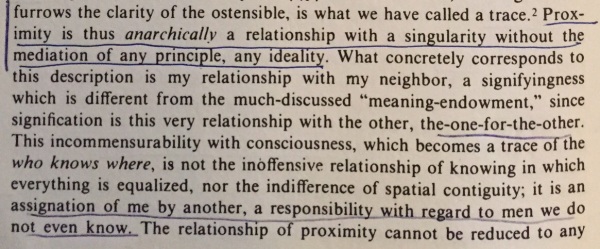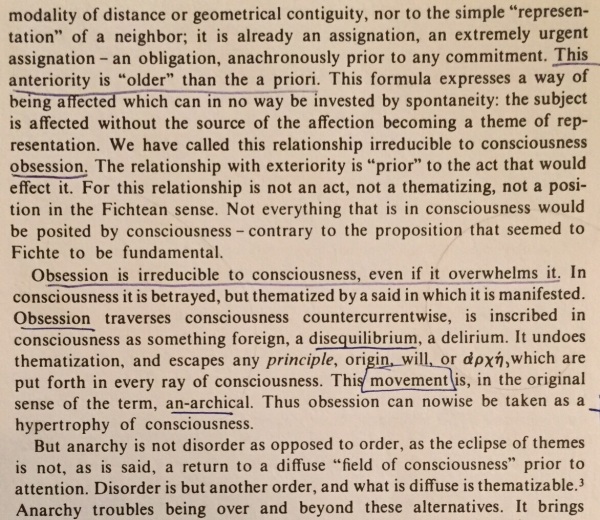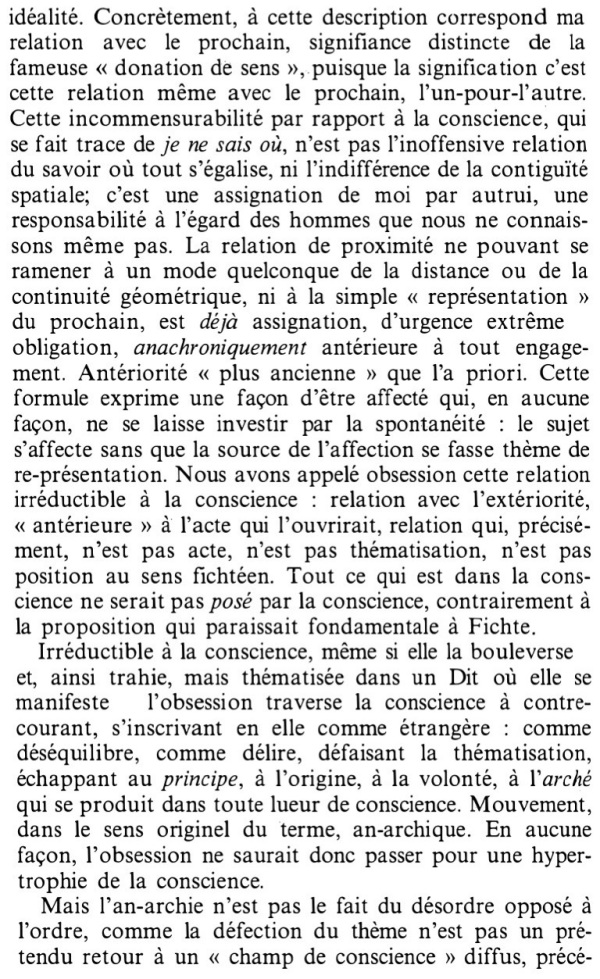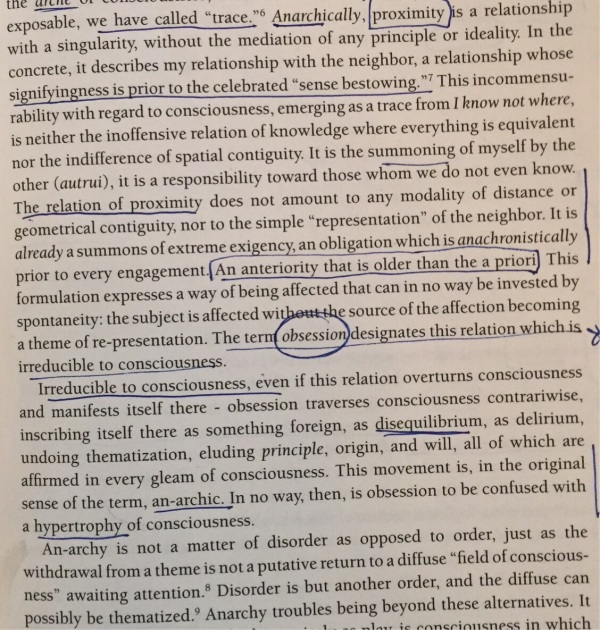 (image from janeadamsart)
(image from janeadamsart)
Anarchy - without the reign of an original When I speak of anarchy, I mean something other than a generic absence of order or a simple negation of rule, origin, or principle. Insofar as chaos is connected to the emergent properties of complex dynamic systems, I have no problem with chaos as a fecund space, loaded with potential for meaning. Yet, shaped by my encounters with the writings of Emmanuel Levinas, something deeper and more subtle is at work in my sense of the gravity of anarchy. Exploiting the koine semantic range of αρχη, which can mean beginning and reign, I hear the an-archic as that which is without the reign of an original.
As a student of bible for much of my life, in personal practice or scholarly pursuit, the reign of αρχη has dominated both the textual tradition and any notion of manuscript awareness. The archic logocentrism of my evangelical exegetical training became immediately apparent in the first verse we learned to read in Greek - εν αρχη ην ο λογος (John 1.1). It is αρχη and all of its resonances with the beginning of LXX Genesis that signals the reign of λογος in a Christian interpretive tradition that claims to take the verbal character of the bible seriously as divine revelation. Couple this with the tenth article of the 1978 Chicago Statement of Biblical Inerrancy,
 which links inspiration and “the [λογος] of God” with the original, autographic text of Scripture, and we can see the deep archic sensibilities of the tradition in which I was reared, even at the material manuscript level.
which links inspiration and “the [λογος] of God” with the original, autographic text of Scripture, and we can see the deep archic sensibilities of the tradition in which I was reared, even at the material manuscript level.
It took David Parker’s careful questioning of this αρχη or original of the manuscript tradition in The Living Text of the Gospels to awaken me to the anarchy at work even in the materiality of bible, but without the language of anarchy. Aware of the ancient Greek semantic potential of αρχη, Emmanuel Levinas, another close reader of biblical texts and tradition, introduced me to an anarchy that was something otherwise than disorder and something significantly more complicated than the simple absence of a beginning or origin. In his essay titled “Substitution,” Levinas takes up the relationship between proximity and the αρχη. At many points in this project, we will struggle with the potential of proximity, from spatial nearness and distance to ap-proximat-ion to a notion of contact without grasp. But for now, we will focus on the anarchic.
Levinas’s essay, “Substitution,” has a manuscript tradition of its own that offers us an object lesson in the anarchic as “without the reign of an original.” In the introduction to the first English translation of an early version of the essay, Bernasconi narrates the life of “Substitution” in Emmanuel Levinas: Basic Philosophical Writings, p. 79.
 Here are three versions of a section of this essay, the french of the later iteration of the essay in Autrement qu’être, it’s English translation by Alphonso Lingis in Otherwise than Being, and the English translation of the 1968 version of the essay translated by Simon Critchley, Peter Atterton, and Graham Noctor. Which is the original? Does it matter?
Here are three versions of a section of this essay, the french of the later iteration of the essay in Autrement qu’être, it’s English translation by Alphonso Lingis in Otherwise than Being, and the English translation of the 1968 version of the essay translated by Simon Critchley, Peter Atterton, and Graham Noctor. Which is the original? Does it matter?
Alphonso Lingis translating Emmanuel Levinas, Otherwise than Being, 100-101.

 Emmanuel Levinas, Autrement qu’être, 158-160.
Emmanuel Levinas, Autrement qu’être, 158-160.


 Critchley, Atterton, and Noctor translating Levinas, Emmanuel Levinas: Basic Philosophical Writings, 81
Critchley, Atterton, and Noctor translating Levinas, Emmanuel Levinas: Basic Philosophical Writings, 81
 Instead of worrying about which of these moments in the life of this essay is closest to some originary articulation of these ideas from Levinas in his 1967 lecture, can we read them together, an-archically, “as disequilibrium, as delirium, undoing thematization, eluding principle, origin, and will, or αρχη…Mouvement, dans le sense originel du terme, an-archique.”
Instead of worrying about which of these moments in the life of this essay is closest to some originary articulation of these ideas from Levinas in his 1967 lecture, can we read them together, an-archically, “as disequilibrium, as delirium, undoing thematization, eluding principle, origin, and will, or αρχη…Mouvement, dans le sense originel du terme, an-archique.”
I have intentionally created a mashup quote using bits from each of these fragments as a practice of anarchic reading. Isn’t it interesting that a discussion of the anarchic as eluding or escaping origin points to le sense originel du terme? I am also struck by the potential poetic movement of délire de lire in our exploration of the cultural production of bible.
Despite the semantic negation built into the word an-archy, I am uninterested in arguing for the absence of original. We can always construct an original given a particular data set and timeframe. Instead of eradicating any notion of original, I am asking us to consider a kind of reading, a mode of making, and a way of being human that operates without the reign of an original. This is the anarchy at work in a proximate bible.
See placing anarchy for a discussion of anarchy at work in the spatiality and approximation of Edward Soja’s thirdspace and simularchic for more on the operation of anarchy in Baudrillardian simulacrum.